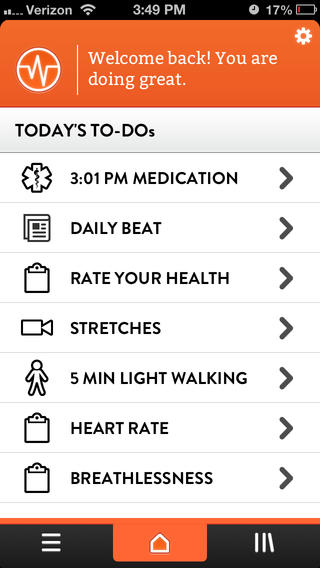 Following a one-year pilot, Boston's South Shore Hospital has inked a two-year agreement with Wellframe to make its mobile platform a part of its cardiac rehabilitation program. The deal marks Wellframe's first commercial deployment. The startup was also a member of incubator Rock Health's fourth class of startups.
Following a one-year pilot, Boston's South Shore Hospital has inked a two-year agreement with Wellframe to make its mobile platform a part of its cardiac rehabilitation program. The deal marks Wellframe's first commercial deployment. The startup was also a member of incubator Rock Health's fourth class of startups.
Wellframe's platform includes a web-based clinician dashboard and a patient-facing mobile app, which is available for Apple and Android devices. The offering includes two-way, HIPAA compliant messaging and a care plan that the company says aims to amplify, not replace, therapeutic relationships: "Complex care protocols are converted into rich multimedia to-do lists which are delivered to patients on their phones and tablets," the company states on its site. "All the data collected from patient’s interactions with their care plans is analyzed in real time and then displayed on a bespoke care management dashboard for clinicians. Intelligent alerts driven by powerful predictive algorithms help clinicians understand who needs attention much earlier than has ever been possible."
Wellframe's founding team includes CEO Jacob Sattelmair, a Harvard and Oxford-trained trained public health scientist and technologist, who previously worked as director of research and strategy at Dossia and as a product manager at RunKeeper. Another Wellframe co-founder is Trishan Panch, a primary care physician and Harvard-trained health systems expert who was also the clinical director of global mHealth initiative Sana Mobile.
For the cardiac rehab program at South Shore Hospital, Wellframe's platform is currently being used to help manage a few dozen patients who are still within 90 days of an episode or procedure, South Shore Hospital's Nurse Manager Karen Lafond. After the first 90 days, the platform automatically categorizes a patient into the "maintenance" tab for those 90 days to 120 days out from an episode or procedure. Lafond said the hospital created a third tab for those patients who still wanted to use the program six months after starting since it usually takes at least that long to form new longterm health behaviors, she said.
The Wellframe apps includes the two-way messaging, automatic medication reminders, activity tracking, short messages of educational content, and other short questions, including: describe what you ate at your last meal. Lafond said it also includes some nondiagnostic mental health questions.
"This is the first app that I’ve seen that is tied to a clinician dashboard," Lafond told MobiHealthNews. "Patients out there are using LoseIt or MyFitnessPal and others for self-help but none of them are tied to clinician dashboards or used in a clinical setting that I’m aware of."
Lafond noted that during the pilot her team found patients who used the app were more compliant and also had about half as many no-show appointments when they were supposed to come in for an in-person visit. Other patients using the platform may not be able to afford the copay (usually around $40, Lafond said) that it costs for an in-person visit. The traditional cardiac rehab program would include about three 1-hour visits to the clinic each week. Lafond said some patients are coming in once a week and using the Wellframe platform the rest of the time to stay connected. She doesn't think it is replacing the in-person care, however, because many of those patients wouldn't be coming in for financial or scheduling reasons.
Lafond also heads up the hospitals program for pulmonary disorders, like COPD. She said that Wellframe is working on a care program for COPD and that South Shore Hospital aims to pilot it.















